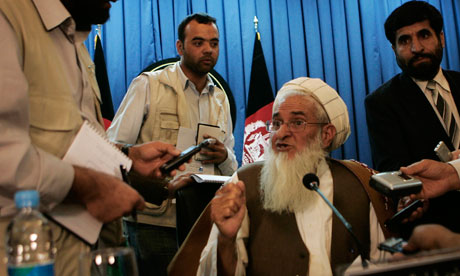
Qiyamuddin Kashaaf, spokesman for the high peace council, set up by Karzai with the aim of pursuing a political settlement. Observers say that there is 'less than meets the eye' to Karzai's talks. Photograph: Ahmad Massoud/AP
Recent widely-reported contacts between senior Taliban and the Kabul government have little to do with a peace settlement and involve scarcely more than exchanges of cash and prisoners, diplomats and observers have told the Guardian.
They say contacts with the Taliban have been under way for several years and reflect how war is waged in Afghanistan, where talking and fighting at the same time are common. But the encounters have been hyped as signs of a move towards peace as part of a misinformation campaign aimed at the Taliban leadership, or to reinforce the impression that Nato and Afghan forces are making strategic gains.
Anticipation of a breakthrough rose earlier this month after Nato officers and Afghan officials briefed journalists that there had been high-level contacts between President Hamid Karzai and senior Taliban members.
Karzai claimed to "have had personal meetings with some Taliban leaders" and has set up a high peace council with the aim of pursuing a political settlement.
Nato officials spoke of meetings with four Taliban commanders, including a top member of the movement claiming to express its "collective will" with the approval of its leader, Mullah Omar.
The US and Nato commander in Afghanistan, General David Petraeus, even said his forces had facilitated the talks by allowing Taliban officials to fly to the meetings in safety.
But according to officials briefed on the talks, there is, in the words of one source, "less than meets the eye".
The Taliban member who flew to Kabul to meet Karzai was influential, but not a member of the Quetta Shura leadership council, and probably did not represent its views. Karzai did not raise the prospect of power-sharing or division of territory, but rather sought to buy his Taliban interlocutors off one by one by offering cash.
In each case, the Taliban commanders asked for small amounts of money, gave no undertakings on future actions, and returned to their havens in Pakistan.
The New York Times today quoted unnamed officials as alleging the Karzai government was using a slush fund supplied by Iran to buy the loyalty of Taliban commanders, and to bribe members of the Afghan parliament as well as tribal elders. According to one source, the Taliban participants also asked for the release of family members and friends from Afghan prisons.
Parallel contacts between Kabul and the Haqqani insurgent network, based in Pakistan's North Waziristan tribal territory, are also reported to have been unproductive.
Commenting on the accounts, Michael Semple, a former UN and European envoy with a history of contacts with the Taliban, said: "We know this kind of thing has been going on for a long time. That is the way Karzai operates, but it's also standard operating procedure for Afghanistan."
Semple, who is now at the Carr centre for human rights policy at Harvard University, said: "It's traditional for people on either side to develop linkages. The enemy go to the other side and make tactical requests. It's not just money but also requests for brothers and cousins to be let out of jail. Its a case of: give me a few bob and free my cousin." He added that the fact the talks were being leaked so freely by Kabul and Nato suggested there was little substance to them. "If this were a serious process they would be guarding its confidentiality for dear life," he said.
Baryalai Helali, a member of the High Peace Council, said there had been contacts between the top of the Taliban and the government since 2002.
For its part, the Taliban has vehemently denied the existence of any talks, distributing an email last week accusing Nato forces, "their Afghan puppets and western media outlets" of "organised propaganda" designed to make it "appear as though mujahideen of the Islamic emirate were ready for negotiations and that they have made progress in that regard".
Wahid Mujda, a political analyst who served in a mid-ranking capacity in the Taliban government of the 1990s, said something was going on – but not the start of a serious peace process.
He suspected one of the men involved in the talks was Maulvi Abdul Kabir, a member of the Quetta Shura reportedly arrested in Pakistan in February. "Once you are arrested you no longer have any authority to talk on behalf of the Taliban," he said. "And the Taliban have been very consistent that they will never talk to what they regard as a puppet government and will only talk direct to the Americans. It is very strange to me that there would be such a big change from Mullah Omar."
Alex Strick van Linschoten, an expert on the Taliban based in Kandahar, agreed. "People in conflict in Afghanistan will always extend contacts with each other. It doesn't mean peace is at hand," he said. "We are at the middle of the middle of this thing, not even the beginning of the end."
He suggested the reports of peace contacts were being stoked by Nato to create a favourable backdrop to the December Afghan strategy review in Washington, where the Obama administration will assess progress and make decisions on US commitments in Afghanistan.
Nato officials pointed out they had been cautious in describing the contacts and had been sceptical over claims by Taliban participants to represent the Quetta Shura or Mullah Omar.
One official, however, admitted one reason the contacts had received so much publicity was an attempt to confuse Taliban leaders: "This is about throwing sand in their ears," the official said.
Resource from: Guardian







